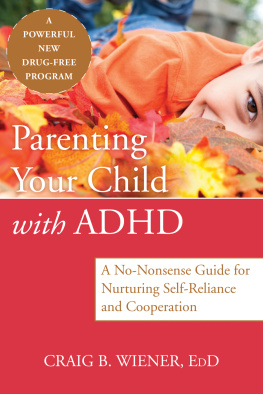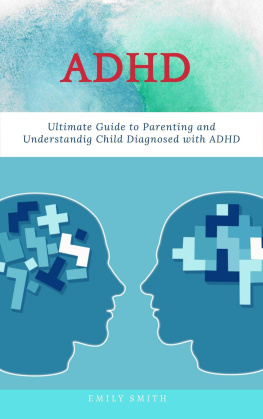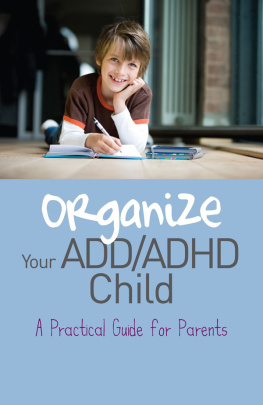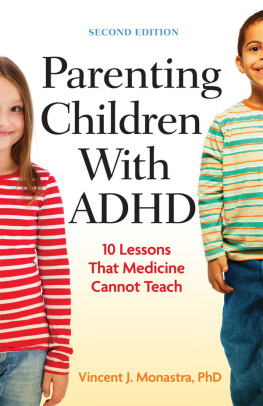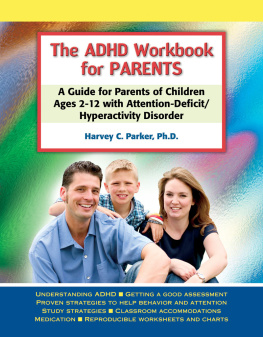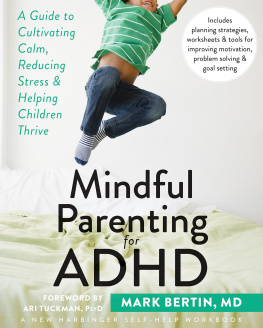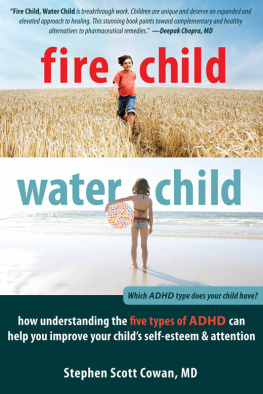Craig B. Wiener, EdD, has worked for over thirty years to help individuals diagnosed with attention deficit/hyperactivity disorder. He is a licensed psychologist and faculty member in the Department of Family Medicine and Community Health at the University of Massachusetts Medical School. His years as clinical director of outpatient mental health at the Family Health Center of Worcester and clinical experience in private practice led him to create a unique approach that identifies the factors that contribute to the reinforcement of ADHD behaviors. He lives in Worcester, MA.
If you have picked up this book, you are probably frustrated and looking for some answers. After teaching parenting for over 30 years, this is by far the most helpful, practical book I have read on ADHD. If you are tired of yelling, threatening, taking away privileges, and bribing, then this book is a must-read.
Kathryn Kvols, author of Redirecting Childrens Behavior and president of the International Network for Children and Families
A practical, non-judgmental guide for parents seeking an alternative to medication.
L. Alan Sroufe, PhD, professor at the Institute of Child Development, University of Minnesota, and author of The Development of the Person
I highly recommend this book for all educators who are seeking alternative methods to work with students who test the boundaries of behavior. Craig B. Wiener gives us examples and insights to assist us in understanding why and how some children who were previously described as having conditions can be worked with using techniques that can modify unacceptable behaviors. This book supports the Montessori method, which also endorses doing the hard work necessary to help the child for the long term. I suggest to anyone interested in positive results to put in the time and effort with methods that are outlined in Wieners new book.
Christine Kovago, director at Pincushion Hill Montessori School

Publishers Note
This publication is designed to provide accurate and authoritative information in regard to the subject matter covered. It is sold with the understanding that the publisher is not engaged in rendering psychological, financial, legal, or other professional services. If expert assistance or counseling is needed, the services of a competent professional should be sought.
Distributed in Canada by Raincoast Books
Copyright 2012 by Craig B. Wiener
New Harbinger Publications, Inc.
5674 Shattuck Avenue
Oakland, CA 94609
www.newharbinger.com
All Rights Reserved
Acquired by Jess OBrien; Cover design by Amy Shoup; Edited by Will DeRooy; Text design by Tracy Carlson
Library of Congress Cataloging-in-Publication Data
Wiener, Craig.
Parenting your child with ADHD : a no-nonsense guide for nurturing self-reliance and cooperation / Craig B. Wiener.
p. cm.
Includes bibliographical references.
ISBN 978-1-60882-396-3 (pbk. : alk. paper) -- ISBN 978-1-60882-397-0 (pdf e-book) -- ISBN 978-1-60882-398-7 (epub)
1. Attention-deficit-disordered children. 2. Attention-deficit-disordered children--Behavior modification. 3. Parenting. I. Title.
RJ506.H9W523 2012
618.928589--dc23
2012024164
In memory of my parents, Morton and Beatrice
To my wife, Patricia, and sons, Scott and Casey
We were preparing for the Monday evening ADHD clinic. The first person to register was the mother of a boy about five years old. Sporting a T-shirt that advertised, Here comes trouble! he darted about in the reception area. As we tried to settle the family in the office, the mother, looking tired and discouraged, started to tell us the boys story. While we attended to her, Trouble snatched a jar of pencils and pens off a table and watched them spill on the floor. He monitored his mothers look of helplessness and smirked. The therapist and I exchanged glances, and the mother burst into tears.
Rosemary Quagan
Contents
Acknowledgments
A special thanks to Wendy Millstine, NC, at New Harbinger Publications for asking me to write this book after seeing my ADHD presentation at a recent American Psychological Association convention. Her support and encouragement were extremely helpful.
My appreciation also goes out to Jess OBrien and the editorial staff at New Harbinger Publications. They truly give expert advice. When coupled with the enthusiasm of the marketing department, the entire project has been an authors dream.
I would also like to thank Rosemary Quagan, my colleague at Family Health Center of Worcester, for her assistance and friendship. And I applaud Will DeRooy for his very intelligent copyediting. If you have a manuscript that you would like to improve, give this man a call.
Introduction
This book is meant for parents of children diagnosed with attention deficit/hyperactivity disorder (ADHD), whether or not their child is already receiving treatment. It will help you understand ADHD in a new way and put you on a different course with your child. You will discover new ways to keep ADHD behavior from happening, and you will help your child more successfully meet expectations on his own and when interacting with others. You will learn that ADHD is not a permanent health impairment. ADHD is something that your child does rather than something that he has. Its a pattern of behavior, not a medical condition.
Have you noticed that your child is much less hyperactive, impulsive, and inattentive when engaged in an activity that he initiates and enjoys? Perhaps, for example, he can play with interlocking blocks for hours on end if left to himself. Time for self-directed play is very important to children, and they may not like having to adapt to limits on their behavior and requirements that they do other things. When directed or pressured to behave in certain ways, children may feel uncomfortable, and this discomfort makes ADHD behavior more likely. Unfortunately, its necessary to place limits and requirements on children, because they have not yet learned about the dangers and the necessities of life.
So how do you establish ways of interacting that are comfortable for both of you? How do you get your child to cooperate without a hassle when he wants to do something else? How can you help him gradually assume responsibility and independence when he likes to have you do things for him? How can you get him to follow through when no one is watching over him?
As you read this book, you will see that its not all that hard. But be prepared to be patient. Whereas threats and demands can produce instant conformity, helping your child learn self-reliance and cooperation is vastly superior but can take significantly more time. Occasionally, you may be unsure whether your efforts are working. For example, when your child throws a tantrum and you do not react, you are essentially permitting the unwelcome behavior in the short term. But your reluctance to feed into the drama may prove very effective in the long term.
You might also wonder whether you are being too lenient or whether you are letting your child get away with misbehavior when you use this new style of parenting. You might think that you are being negligent or that you are not doing all you can to eliminate his problems. However, the strategies in this book are not permissive at all. As you put them into use, you may find that you are being more assertive and firm than you have been. And the earlier you start the better.
This book will help you ease your child into more mature behavior. Eventually, he will do more on his own rather than depend on your reminders. He will give more consideration to others feelings and behave in ways that make life easier for both of you.

